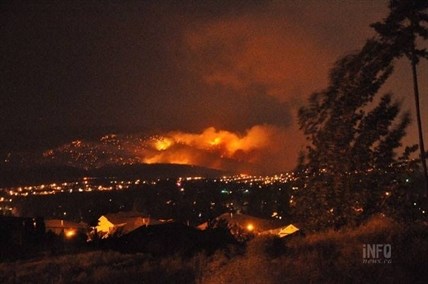
Smith Creek fire in 2014.
(MARSHALL JONES / iNFOnews.ca)
July 08, 2015 - 10:30 AM
WEST KELOWNA - Most municipal mayors, when given the chance, will trumpet the achievements of council and staff, but in the preface to its 2014 annual report, West Kelowna Mayor Doug Findlater talks mainly about one thing — how last year’s fire season affected the outlook of city council and staff.
“We had two major events and three smaller events where the emergency operations centre was activated. Most communities rarely have to do that,” Findlater says.
Last year, the fire season for West Kelowna began with the first Smith Creek fire on July 14 and the first Mt. Boucherie fire a day later. No sooner had those fires been brought under control when the second, much more serious Smith Creek fire broke out, forcing 2,500 people from their homes. A second fire on Mt. Boucherie came just as Smith Creek was winding down, followed just two days later with a fire on Drought Hill.
Findlater now counts West Kelowna staff as amongst the most experienced in the province in dealing with emergency situations and while the city has yet to see any evacuations this year, the mayor thinks it’s only a matter of time before they are pressed into service again.
“We made a point of having a lot staff involved in those situations, so they are very well trained in what goes on in an emergency operations centre, working with other communities, the support services, the evacuees, the utilities, support for firefighters.”
But the 2014 fire season has done more than give staff a chance to work in the field, it’s also forced a change in mindset about the summer months and how they can affect day-to-day operations.
“It’s becoming a way of life. People are factoring in that they might not be able to take holidays in the summer, that they won’t have a full complement of staff and that work may be disrupted during summer months,” Findlater says.
He senses also a new wariness in West Kelowna residents after last year’s onslaught of wildfire.
“People are quite jumpy. There’s a very high level of awareness and fear. After having been evacuated from my house in Glenrosa in 2009, I can say you are never quite the same after you’ve been part of an evacuation. Even if you’re not in imminent danger there’s this realization that you could lose everything. All the more reason to have the grab-and-go bag,” Findlater adds.
On a policy level, the mayor says there is fresh impetus to keep after the province for more fuel mitigation funding.
“It is cost effective. The province spent something like $300 million last year, surely they could spend a few more million getting rid of the fuel before these things happen.”
Findlater says council is also pushing for the legislative tools to force fuel mitigation on private land, something that does not currently exist.
“We’re not talking about Joe Blow with a few trees on his land, we’re talking about big chunks of land in and around municipalities that are held for future development,” he says. “Some of them are heavily forested and someday they may be developed but in the meantime, they are a big fire hazard. We really need the province to step up to the plate on this issue.”
To contact the reporter for this story, email John McDonald at jmcdonald@infonews.ca or call 250-808-0143. To contact the editor, email mjones@infonews.ca or call 250-718-2724.
News from © iNFOnews, 2015